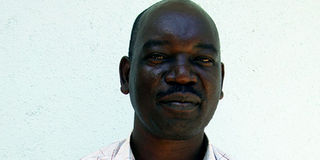Former AP boss is a 'high profile witness'

Mr Oku Kaunya. Photo/ISAAC WALE
A senior provincial administrator, who has expressed fears for his life is ranked as a ‘high profile witness’ in case of any trials connected to the post-election violence, it was revealed on Sunday.
The statutory Kenya National Commission on Human Rights demanded that the government provide Nyanza deputy provincial commissioner Oku Kaunya with extra security or even move him to safety in another country.
Armed escort
“Mr Kaunya is one of the high-profile witnesses and his armed escort should be boosted in the wake of the reported threats, which are understood to be the reason he went missing for three days last week,” the KNCHR vice-chairman Hassan Omar, said. Mr Omar said the government also has the option of moving Mr Kaunya to a foreign station, if he continues to feel unsafe in the country.
The human rights body is among organisations that carried out independent investigations into post-election violence and their reports are believed to form the basis on which the International Criminal Court (ICC) has called for the prosecution of 20 prominent Kenyans. Mr Hassan said the former Administration Police Training College commandant may have been among senior police officers who testified in camera to the Waki Commission on post-election violence.
Mr Omar, however, conceded that he does not know what evidence Mr Kaunya had as he did not make any statements to the human rights body. He said Mr Kaunya’s testimony would be considered crucial as it would provide insight into what he referred to as “State responsibility.”
“As a holder of inside information, he would be very valuable in trials and can be the link between pre- to post-election misconduct by the security forces and to the official policy of government at the time,” Mr Hassan said. Indications are that Mr Kaunya’s troubles are related to what he may know about the suspected role of the Administration Police in the immediate pre- and post-election period.
According to the Waki report, the AP training college, headed then by Mr Kaunya, was a central cog in the chain of events leading to the crisis. It said 1,600 officers were sent to the college for ‘special training’ so that they could act as election agents for PNU. “All officers deployed were dressed in plain clothes, easily identified as they were not from the local community and travelled in large groups by more than 30 chartered buses,” the report said.
“In addition they received Sh21,000 each for their duties. The entire exercise was called off after some officers were killed and many more injured by citizens.”After the elections, Mr Kaunya was transferred to the National Defence College on study leave and then sent to Nyanza as a deputy PC.
Last Friday, his wife raised the alarm that Mr Kaunya had been missing for three days. She even recorded a statement with the police saying he had expressed fears for his life and was being trailed by people he believed were from the AP. Mr Kaunya resurfaced on Saturday in the company of senior government officials to deny that he was missing or that he had gone into hiding. He explained that he was on leave and had gone to an area without mobile network coverage.
Trailing him
He, however, confirmed he had earlier recorded a statement with the police that AP officers had been trailing him in Kisumu and his rural home in Teso District. The human rights body expressed worry about “repeated, consistent and increased” threats to possible witnesses at the trials.
Last week, burglars entered the offices of activist Ndung’u Wainaina at Hazina Towers and carried away computers. Mr Wainaina is one of those pushing for the prosecution of the post-election suspects and is a key informant of the ICC. Last December, Father Jeremiah Roche, an Irish priest who served in Kipkelion, one of the areas worst hit by the violence, was killed.
The KNCHR also asked Parliament to give top priority to the debate on the Witness Protection (Amendment) Bill 2010, to effectively shield potential witnesses at the trials of post-election violence suspects.




